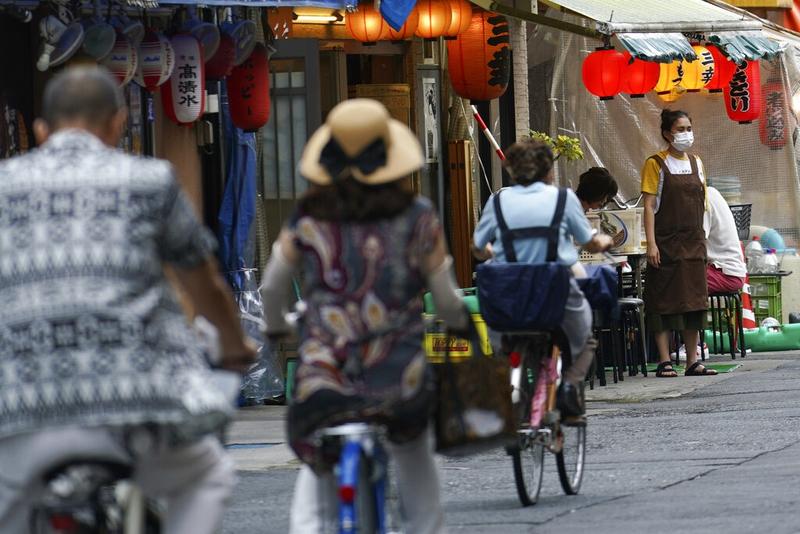 A restaurant employee wearing a protective face mask to help curb the spread of the coronavirus waits for customers in Tokyo, Japan, July 27, 2020. (EUGENE HOSHIKO / AP)
A restaurant employee wearing a protective face mask to help curb the spread of the coronavirus waits for customers in Tokyo, Japan, July 27, 2020. (EUGENE HOSHIKO / AP)
Fitch Ratings cut the outlook on Japan’s sovereign debt rating to negative from stable while keeping the rating unchanged, following a similar move last month by S&P Global Ratings.
“The coronavirus pandemic has caused a sharp economic contraction in Japan, despite the country’s early success in containing the virus,” Fitch said in a statement Wednesday.
Sharply wider fiscal deficits in 2020 and 2021, as we project, will add significantly to Japan’s public debt, which even before the pandemic was the highest among Fitch-rated sovereigns as a share of GDP.
Fitch Ratings
“Sharply wider fiscal deficits in 2020 and 2021, as we project, will add significantly to Japan’s public debt, which even before the pandemic was the highest among Fitch-rated sovereigns as a share of GDP,” the ratings firm added.
ALSO READ: Japan braces for worst postwar economic slump
Japan’s policy makers, like their global peers, are wrestling with spiraling deficits after ramping up spending to fight the impact of COVID-19. Virus cases have risen recently in Tokyo and a slow economic recovery could prompt more government stimulus.
Fitch affirmed Japan’s rating of A for long-term debt. But the firm sounded alarms over the country’s rising number of COVID-19 cases, and the possibility of further containment measures and risks to the economic outlook.
The ratings report had little impact on the yen, which was trading at around 105.07 per dollar Wednesday in Tokyo.
Markets could be negatively affected, though, if moves by the ratings firms spread to impact the country’s banking sector, according to Shunsuke Oshida, a senior credit analyst at Manulife Asset Management.
“If bank ratings are also downgraded, it could raise banks’ dollar procurement costs,” he said.
Japan has pushed up its tally of economic measures to combat the virus impact to around US$2 trillion, roughly 40 percent of the size of its economy.
Still, Fitch and other ratings firms recently said there probably wouldn’t be any ratings consequences if the government drops a pledge to balance its budget by 2025. The bigger concern, they said, was how fast the economy can recover from the pandemic.
Tokyo saw a new daily record in cases last week, prompting the capital’s governor, Yuriko Koike, to ask residents to stay home over last week’s long holiday weekend.
Fitch projects Japan’s economy to contract by 5 percent for the full year in 2020, before rebounding to 3.2 percent growth next year. But the firm didn’t expect GDP to return to pre-pandemic levels until the fourth quarter of 2021.
READ MORE: Japan govt's digital ambitions still stuck in piles of paper
The government will give projections for gross domestic product growth (GDP) based on two assumptions that the pandemic would either end quickly or be prolonged, an unusual move underscoring the unpredictability policymakers face from the health crisis.
GDP is expected to shrink this year under either scenario but it would be smaller than a 5 percent contraction.
Under its most pessimistic scenario for the fiscal year through March 2022, the government expects to see nearly flat, but still positive GDP growth, one of the sources said.
With Reuters inputs


